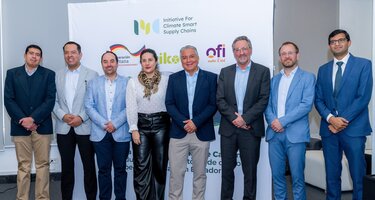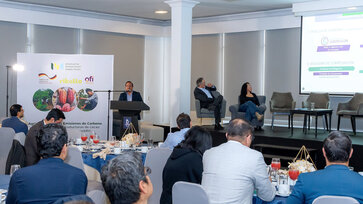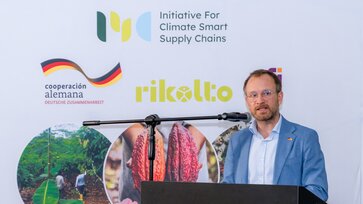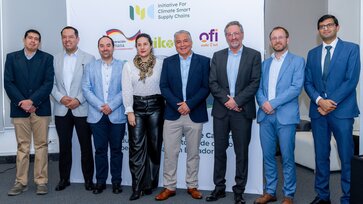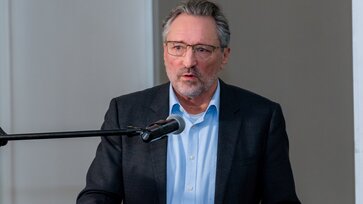I4C and OLAM are fostering climate action in the cocoa supply chain in Ecuador
A consortium co-funded by BMZ and OLAM/ofi, with Rikolto leading the implementation for ofi’s sustainability programs, announced a low-carbon agriculture project in Ecuador. Under the I4C, the project aims to transform cocoa production systems to reduce carbon emissions while reducing income gap for farmers. The project supports the adoption of the European Union Deforestation Free Regulation (EUDR) and helps smallholder farmers keep pace with the demands of international markets. It also strives to support farmers in creating more resilient livelihoods and increasing the efficiency of their cocoa production.
Low-carbon agriculture for smallholder cocoa farmers in Ecuador: an alternative to increase incomes and reduce emissions
Climate change is having a notorious impact on agriculture, displaying extreme temperatures and unpredictable rainfall, altering growing seasons, reducing yields, and increasing pests and diseases. As a result, smallholder cocoa farmers worldwide are facing significant challenges.
The South American country of Ecuador, for example, is the third largest cocoa producer in the world, and here “approximately 60% of Ecuadorian cocoa farmers rely on cocoa as their main source of income.“¹
In that context, a multi-stakeholder consortia co-funded by BMZ and ofi³, with Rikolto⁴ is implementing a low-carbon agriculture project in Ecuador since January 2024, and it will extend until March 2027, having as main intervention areas the provinces of El Oro, Esmeraldas, Santo Domingo, Manabí, Los Ríos, and Guayas.
The project not only aims to reduce the carbon footprint of the cocoa supply chain, but also specifically promotes the dissemination of innovative climate adaptation measures to strengthen the resilience of production systems and smallholder families to climate change. By implementing agroforestry, a regenerative farming approach, cocoa can grow alongside other plant species and encourage circular economy models at a farm level. The technique can help farmers to improve cocoa yields and provide additional income from other planted crops while sequestering carbon and promoting biodiversity.
A total of at least 2,800 smallholder farmers (at least 20% women) in the OLAM/ofis cocoa supply chain benefit from training in regenerative and climate-adapted farming methods, improved cocoa varieties and tailored advisory services. Farmers will be taught to integrate sustainability principles and agricultural standards into existing farming approaches, helping them to boost cocoa productivity and build climate resilience
Have a look at the event at which the project has been recently announced:
Sources and further information
¹ Ecuadorian Ministry of Agriculture and Livestock. 2019. Report on cocoa yields
² ofi (olam food ingredients) is an operating group born out of Olam Group. Itoffers sustainable, natural, value-added food products. It consists of industry-leading businesses of cocoa, coffee, dairy, nuts, and spices. Olam Group is a leading food and agribusiness supplying food, ingredients, feed, and fiber to 22,000 customers worldwide. Their chain spans over 60 countries and includes farming, processing, and distribution operations, as well as a global network of farmers.
³ Rikolto is an international NGO with more than 50 years of experience in partnering with farmer organizations and food chain stakeholders across Africa, Asia, Europe, and Latin America. Annually, Rikolto works with 240 farmer organizations, reaching 83,478 farming families across 18 countries
Visit the Rikolto and Ofi Website as well as the i4C Subpage on our website for more information.
